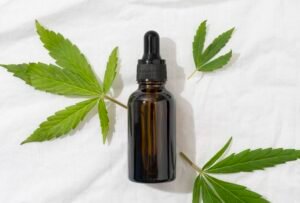Restless Legs Syndrome (RLS) is characterized by uncomfortable sensations in the legs, accompanied by an irresistible urge to move them. These symptoms tend to be most pronounced during the evening and when individuals are at rest, such as when lying down in bed. RLS can significantly disrupt sleep patterns, leading to a considerable decline in overall quality of life.
While there is limited scientific research on the use of cannabidiol (CBD) for managing RLS, some anecdotal evidence suggests that CBD may offer relief from its symptoms. However, it’s important to note that there haven’t been many comprehensive studies specifically focused on the effectiveness of CBD for RLS. More research is needed to better understand the potential benefits and mechanisms of CBD in addressing this neurological disorder.
Also Read: Cannabis Detection
What Is CBD?
CBD, short for cannabidiol, is a cannabinoid, which is a naturally occurring compound found in the cannabis plant. It’s important to note that CBD is distinct from medical marijuana, as marijuana contains a significant quantity of another cannabinoid known as tetrahydrocannabinol (THC). THC is responsible for the psychoactive effects associated with marijuana, which induce the sensation of being “high.”
CBD is typically extracted from hemp plants. The primary difference between marijuana and hemp lies in the THC content. Hemp contains less than 0.3% THC, a concentration that is insufficient to produce any intoxicating effects, ensuring that CBD derived from hemp does not induce a “high.” This differentiation is crucial for understanding the diverse applications and effects of CBD.
Research Around CBD and RLS
Research on the efficacy of CBD for RLS is still limited. While there haven’t been extensive studies specifically focused on CBD and RLS, some individuals have reported using CBD for this purpose. In a small survey conducted in 2021, mainly in the United Kingdom, over 42% of respondents mentioned using CBD to improve sleep or alleviate insomnia, and an additional 5% reported using CBD for RLS. These self-reported uses suggest a potential interest in CBD as a remedy for RLS, but more substantial research is required to substantiate these claims.
Also Read: Secondhand Marijuana Smoke
A small study from 2019 explored the effectiveness of smoking cannabis for RLS, and it suggested that regular cannabis use might lead to a reduction in RLS symptoms. However, it’s essential to note that this study involved participants who smoked cannabis containing THC, the psychoactive component in marijuana. The psychoactive and anxiolytic properties of THC could potentially influence the study’s results, emphasizing the necessity for further research. More comprehensive, large-scale studies are necessary to better understand the potential benefits and effectiveness of CBD for RLS. Further research will help shed light on the precise role that CBD and other cannabinoids might play in managing the symptoms of RLS.
Regarding the types of CBD products, there are three primary categories:
1. CBD Isolate: Often referred to as “pure CBD,” this type contains no other cannabinoids, as they have been entirely removed.
2. Broad Spectrum: This type includes three or more other cannabinoids, potentially containing terpenes and flavonoids that contribute to aromas, flavors, and colors. Notably, broad-spectrum CBD does not contain THC, the psychoactive compound found in marijuana.
3. Full Spectrum: Also known as “whole flower CBD,” full-spectrum CBD is similar to broad-spectrum but may contain up to 0.3% THC. While the THC content is minimal, it’s important to be aware of its presence.
Also Read: Cannabis Allergy Symptoms
These CBD products are available in various forms, catering to individual preferences and needs:
- Oral tablets and capsules
- Chewables and gummies
- Tinctures, oils, and extracts
- Patches, creams, and lotions
- Spray
- Vape pens
Selecting the most suitable CBD product and type is contingent upon your specific requirements and the effects you’re seeking to achieve. It’s advisable to consult with a healthcare professional when considering the use of CBD, especially for medical purposes, to ensure the best product and approach for your needs.
Benefits of CBD for RLS
CBD is being increasingly adopted by individuals from diverse backgrounds to address specific health concerns, including Restless Legs Syndrome (RLS) and sleep-related issues. Many have reported that CBD provides relief when conventional medical treatments are lacking, all while minimizing the occurrence of troublesome side effects. However, it’s important to note that research specifically focused on the use of CBD for RLS remains limited, making it challenging to definitively establish the benefits. If you decide to explore the potential advantages of CBD for managing your RLS symptoms, one helpful strategy is to maintain a journal. In this journal, record details about the specific CBD product you’re using, the dosage, and your responses to the treatment. Over time, maintaining this journal can provide insights into whether CBD is beneficial for your particular situation.
Effects of CBD for Restless Legs Syndrome
While CBD is derived from natural sources, it’s important to recognize that natural products can also have potential side effects. When using CBD for RLS or other purposes, individuals should be aware of the following possible side effects associated with CBD:
1. Sleepiness: Some individuals may experience drowsiness as a side effect of CBD use.
2. Insomnia: Conversely, CBD might lead to difficulty falling asleep in certain cases.
3. Diarrhea: Gastrointestinal discomfort, including diarrhea, is a reported side effect of CBD.
4. Decreased appetite: CBD can influence appetite, leading to reduced hunger in some users.
5. Upset stomach: Stomach discomfort or digestive issues may occur in response to CBD.
6. Irritability: A change in mood, such as increased irritability, has been noted as a potential side effect.
Also Read: Hemp vs. Marijuana
However, it’s important to note that due to limited controlled studies on CBD, there’s insufficient information to comprehensively assess other potential risks and interactions, including:
- Cumulative effects: The long-term effects of CBD usage are not yet fully understood.
- Food interactions: The influence of CBD on food or dietary habits remains an area of ongoing research.
- Effects on various populations: The potential impact of CBD on older individuals, children, and adolescents is not well-documented.
- Effects during pregnancy or while breastfeeding: The use of CBD during pregnancy or while breastfeeding requires further investigation.
- Interactions with common medications: CBD may interact with other medications, particularly those affecting the liver.
It’s worth noting that individuals taking medications that affect the liver should be cautious when using CBD, as there might be an increased risk of liver damage. Additionally, potential interactions between CBD and specific medications, such as immunosuppressive drugs for organ transplants, chemotherapy, and anticoagulants like warfarin (Coumadin or Jantoven), should be thoroughly considered and discussed with a healthcare provider. If you have concerns about using CBD in conjunction with other medications or specific health conditions, it’s advisable to seek guidance from a healthcare professional to ensure your safety and well-being.
Other Treatment Options of Restless Legs Syndrome
Restless Legs Syndrome (RLS) is a condition without a definitive cure, but there are various methods available to alleviate its symptoms and improve sleep quality. For individuals with mild symptoms, treatment may not be necessary. However, those experiencing more severe RLS symptoms can explore a range of non-pharmaceutical treatments to find relief. Here are some alternative options:
1. Alcohol and Tobacco: Reducing or eliminating alcohol and tobacco consumption can have a positive impact on RLS symptoms. Both substances may exacerbate the condition and disrupt sleep, so moderating their use is advisable.
2. Establish a Sleep Routine: Creating a consistent sleep schedule is essential. Going to bed and waking up at the same time each day helps regulate your body’s internal clock and can improve sleep quality.
Also Read: Best Hemp Products
3. Exercise and Leg Stretches: Engaging in leg-stretching exercises and massaging your legs as needed can alleviate RLS symptoms. Regular physical activity, especially in the earlier part of the day, may also help.
4. Warm Bath: Taking a warm bath before bedtime can be soothing and aid in relaxation, potentially reducing the intensity of RLS symptoms.
5. Temperature Therapy: Applying an ice pack or heating pad to your legs, depending on your preference, can offer relief from the discomfort associated with RLS.
6. Compression Foot Wrap: Some individuals find relief by using a compression foot wrap designed to support leg circulation. These wraps can help manage RLS symptoms.
7. Vibration Pads: Devices that deliver gentle vibration to the back of your legs may offer comfort and relaxation, potentially reducing RLS symptoms.
It’s important to note that the effectiveness of these non-pharmaceutical treatments can vary from person to person. If you have persistent or severe RLS symptoms, it’s advisable to consult with a healthcare professional. They can provide guidance on the most appropriate treatment plan, which may include a combination of lifestyle changes, non-pharmaceutical methods, and, if necessary, medications to manage the condition effectively.
FAQs
Q. What is Restless Legs Syndrome (RLS), and how does it affect individuals?
A. Restless Legs Syndrome (RLS) is a condition characterized by uncomfortable sensations in the legs, accompanied by a compelling urge to move the legs. Symptoms are typically most severe during the evening and when individuals are at rest, making it challenging to sleep and significantly impacting their quality of life.
Q. Is there scientific evidence supporting the use of CBD for RLS?
A. While some anecdotal evidence suggests that cannabidiol (CBD) may offer relief from RLS symptoms, comprehensive studies focusing on the effectiveness of CBD for RLS are limited. More research is needed to better understand the potential benefits and mechanisms of CBD in managing this neurological disorder.
Q. Are there any scientific studies on the use of CBD for RLS?
A. Currently, there is limited scientific research specifically focused on the use of CBD for RLS. While some individuals have reported using CBD for RLS symptoms, more comprehensive studies are necessary to confirm its efficacy.
Q. What are the different types of CBD products available?
A. CBD products come in three main types: CBD isolate (pure CBD), broad-spectrum CBD (containing other cannabinoids except THC), and full-spectrum CBD (similar to broad-spectrum but may contain up to 0.3% THC). These products are available in various forms, including oral tablets, capsules, tinctures, oils, patches, creams, and more.
Q. What are the potential side effects of using CBD for RLS?
A. The potential side effects of using CBD may include sleepiness, insomnia, diarrhea, decreased appetite, upset stomach, and irritability. Due to limited controlled studies, comprehensive assessments of other risks, such as cumulative effects, food interactions, or effects on specific populations, are not yet available.
Q. What steps should I take if I’m considering using CBD for RLS?
A. If you’re considering using CBD for RLS, it’s best to start with a low dose and gradually increase it if needed. Discuss dosing and potential interactions with a healthcare provider or pharmacist, and maintain a journal to track the product, dose, and your response over time to assess its effectiveness.








